Talent vs practice: can anyone learn music?
I wrote a short, calm guide to clear the fog and meet you where you are. Below I summarize what research says about genes and training, how studies split nature and nurture, what twin and family work shows, and how I use deliberate practice, simple steps, and a basic plan. I explain why short daily practice beats rare long sessions, give quick drills for fast wins, show how I track progress, pick a teacher or good apps, and stay motivated through setbacks. This is a practical roadmap you can actually use. I also outline a simple daily practice routine you can start today.
Key takeaway
- I believe practice grows musical skill more than luck.
- Small daily steps beat rare long sessions.
- Focused practice beats random playing.
- Give yourself patience and kind feedback.
- Joy and consistent effort make music yours.
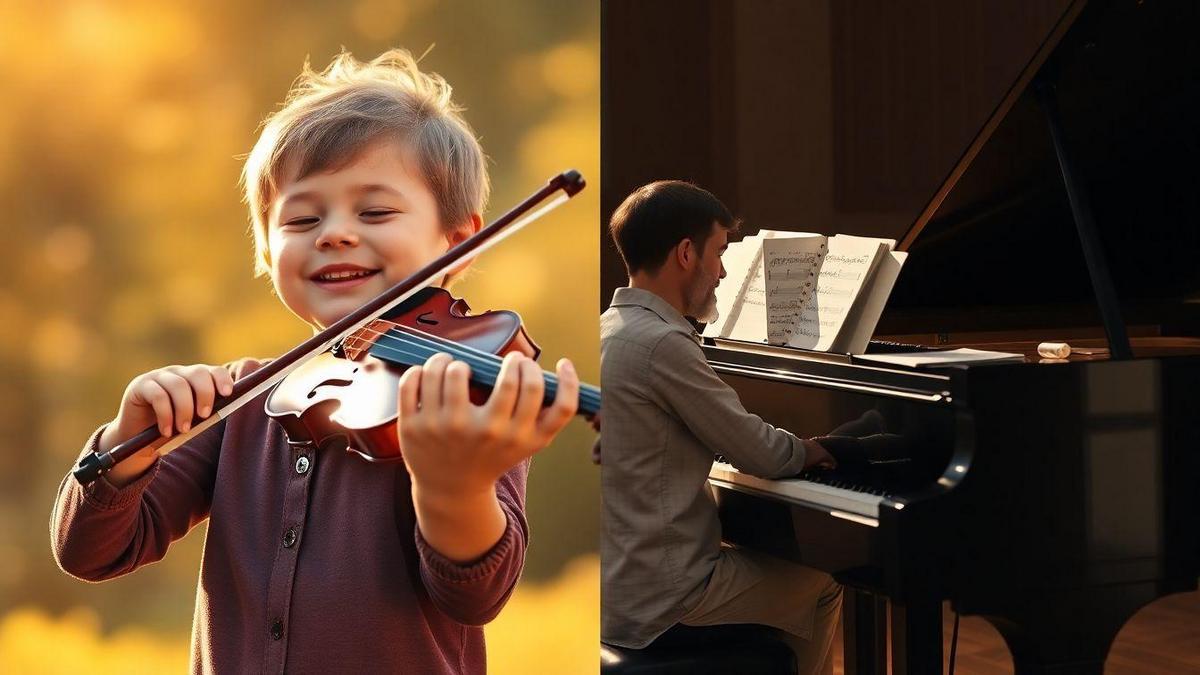
Introduction: Talent vs practice: can anyone learn music?
I’ve wrestled with this question myself: Talent vs practice: can anyone learn music? I felt stuck watching others pick things up faster. Science and simple habits gave me hope. Here’s what I learned, in plain words.
What research shows about nature vs nurture in musical ability
Both genes and practice matter. Some people have advantages in pitch or rhythm, but practice shapes most of the outcome. Key points:
- Genes can give a head start (pitch memory, rhythm sensitivity).
- Early training helps, especially for rare traits like perfect pitch.
- Consistent practice builds lasting skill.
- Most studies show a mixture of causes — so your work counts.
How studies separate genes and training
Researchers use methods that pull different threads; for an overview of nature versus nurture research, see Britannica. Together they show: both matter.
| Study type | How it separates genes and training | What it shows |
|---|---|---|
| Twin studies | Compare identical vs fraternal twins | If identical twins are more similar, genes play a role |
| Adoption studies | Compare adoptees to birth and adoptive families | Helps split home training from inherited traits |
| Longitudinal / early training | Follow kids before & after lessons | Shows how lessons change skill |
| Genetic studies (GWAS) | Search gene variants linked to musical traits | Points to genetic markers |
| Practice intervention | Give one group specific practice, compare to another | Tests how training alone improves skill |
Quick evidence summary
- Genes give some starting advantages.
- Early lessons help certain skills.
- Consistency and deliberate practice produce steady gains.
- Fair take: you may start ahead or behind, but practice changes the outcome.

How genetics and musical ability interact
I ask myself: Talent vs practice: can anyone learn music? The honest answer: genes influence starting points, but do not fix your final level. Environment, lessons, teachers, and deliberate work matter a lot.
What genes can predict vs cannot:
- Can predict: pitch recognition tendencies, rhythm sensitivity, some predisposition to absolute pitch (with early exposure).
- Cannot predict: final performance level, persistence, creativity, or how much you improve with focused practice.
| What genes can predict | What genes cannot predict |
|---|---|
| Basic pitch recognition | Final performance level |
| Tendency to sing in tune | How much you’ll persist |
| Risk for absolute pitch (with early training) | Creativity or musical taste |
| General musical sensitivity | Amount of improvement with practice |
I started late and practiced 20 minutes a day — I improved fast. That convinced me practice matters.
Twin & family studies — realistic takeaways
- Heritability for musical traits often ~40–60% — genes explain part, not all.
- Absolute pitch shows higher heritability but needs early exposure.
- Family clustering reflects both genes and shared environment.
- Twins with different practice habits show the practicing twin improves more.
Clear takeaways:
- Genes set starting points.
- Deliberate practice changes the map.
- Early exposure helps certain traits.
- Mindset and grit often outweigh small genetic edges.
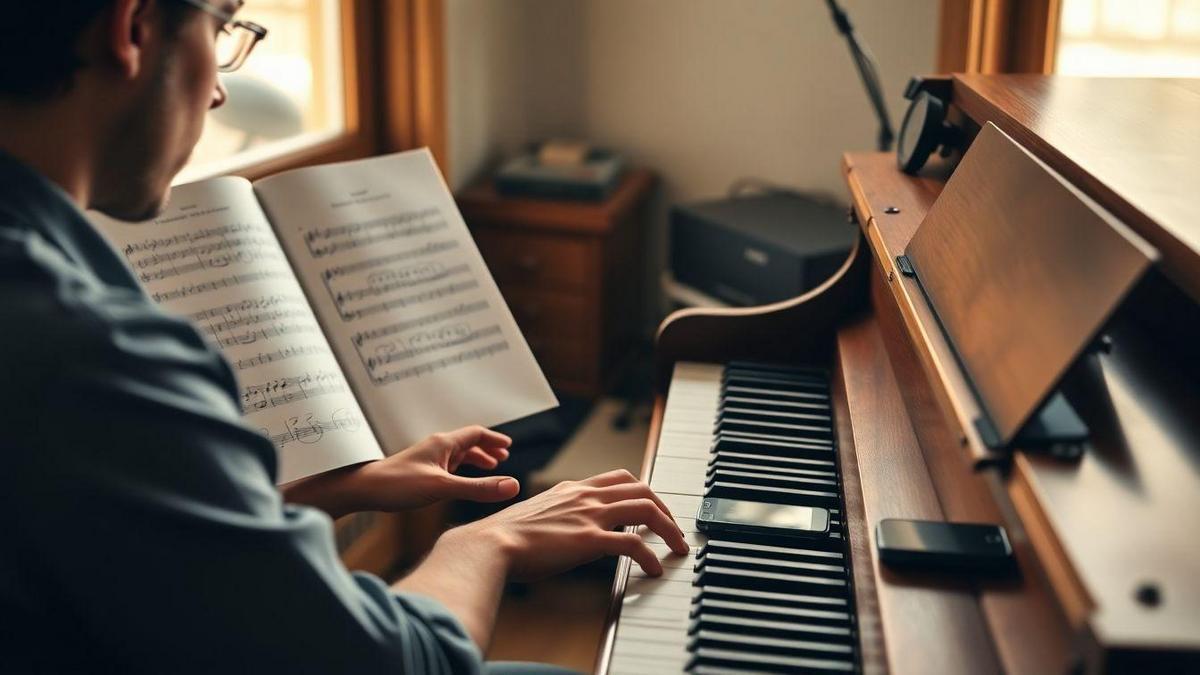
How I use deliberate practice for music improvement
Deliberate practice = practice with a clear, focused goal that fixes a weak spot. The core ideas of deliberate practice method explain the origin and structure of this approach (Ericsson et al.).
Steps I follow:
- Pick one goal (e.g., clean up the first four bars).
- Slow it down to play perfectly for a few notes.
- Repeat in short bursts, rest, repeat.
- Get feedback (record or ask someone).
- Raise the challenge gradually.
- Track progress each session.
Why focused drills beat random playing:
- Target the weak link so the whole piece improves.
- Correct repetition builds muscle memory.
- Feedback accelerates learning.
- Short intense work avoids burnout.
If you ask, Talent vs practice: can anyone learn music? — my experience: practice wins for most people. Talent may help early, but focused work gets you farther.
| What I do | Random playing | Focused drills |
|---|---|---|
| Goal | None | One clear goal |
| Speed | Varies | Start slow, then increase |
| Feedback | Rare | Immediate (record/teacher) |
| Result | Fun, slow growth | Faster, steady progress |
A basic 30-minute deliberate practice plan
| Time | Focus | Action |
|---|---|---|
| 0–3 min | Warm-up | Scales or patterns slowly |
| 3–12 min | Skill drill | One problem (4–8 bars) very slowly |
| 12–18 min | Feedback | Record/listen; fix one error |
| 18–25 min | Apply | Put fixed part into the song |
| 25–30 min | Cool down & note | Play something you enjoy; write one note for next time |
Small, steady sessions add up fast. For a ready step-by-step template, see the linked daily practice routine I use.
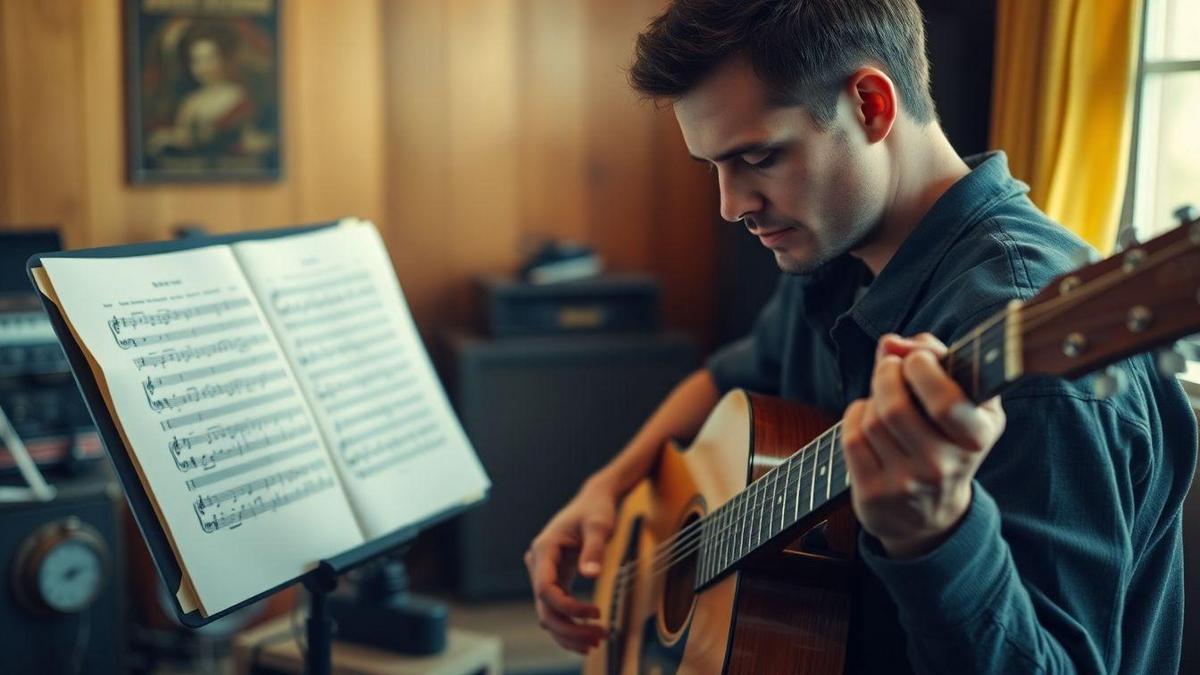
Why short daily practice helps more than rare long sessions
I switched from 3 hours once a week to 20 minutes daily — progress sped up. Short sessions:
- Fight fatigue, preserve focus.
- Let ideas consolidate between sessions.
- Match research: distributed practice > cramming.
See research-backed spaced and retrieval practice strategies for evidence that frequent short sessions beat massed practice.
Again: Talent vs practice: can anyone learn music? — answer from experience: yes. Practice shapes skill; talent is a head start, not a destiny.
How repetition builds habits and muscle memory
Daily repetition moves tasks from thinking to doing — that’s muscle memory. Break songs into bars, repeat until comfortable, then link parts together.
Quick tips:
- One tiny goal per session.
- Repeat slowly and clearly.
- Stop when focus drops.
Sample weekly rhythm (short sessions)
| Day | Focus | Duration | Goal |
|---|---|---|---|
| Mon | Warm-up technique | 15 min | Wake up fingers |
| Tue | New material | 20 min | Learn 1 bar/phrase |
| Wed | Review slow play | 15 min | Fix mistakes |
| Thu | Rhythm & timing | 15 min | Use metronome |
| Fri | Connect phrases | 20 min | Link parts |
| Sat | Play-through fun | 25 min | Enjoy a whole piece |
| Sun | Rest/light review | 10 min | Keep touch |
Short sessions mean you rarely dread practice — even 5 minutes counts.
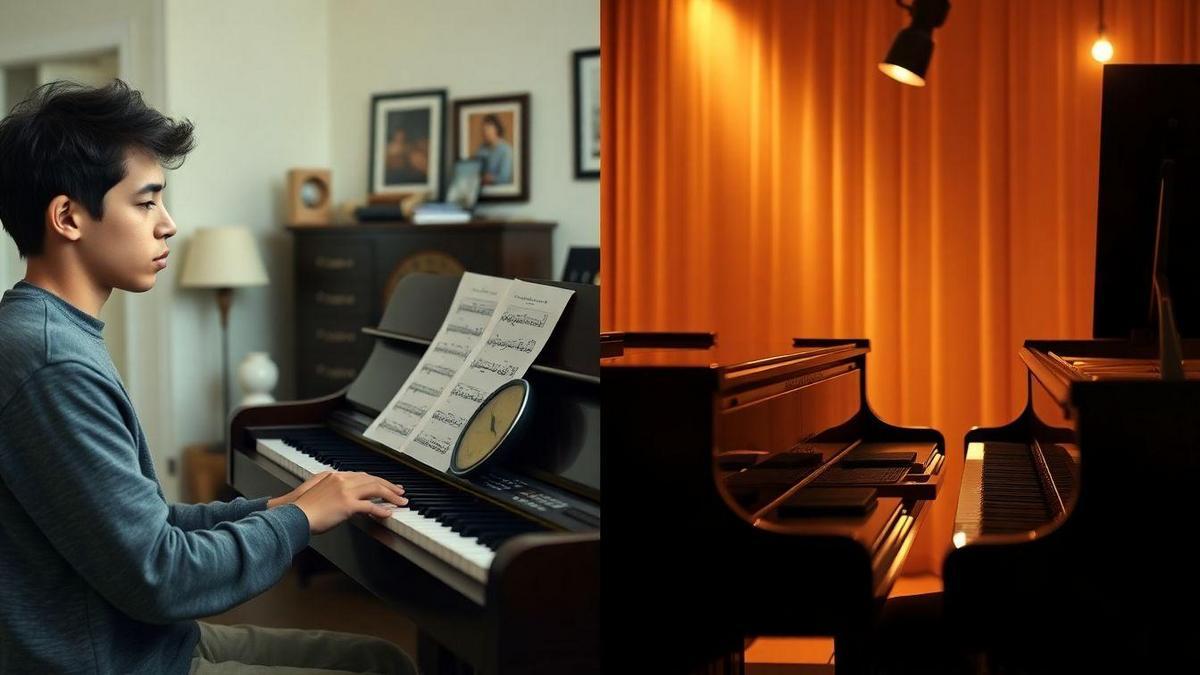
Talent vs practice: can anyone learn music? — my honest view
I learned guitar at 28 with ten minutes a day. After six months I could play three songs clean. That habit mattered far more than any “gift.” If you feel stuck, remember progress is usually tiny gains stacked over weeks.
Why kids and adults both make steady progress
Kids: time, habit-forming, flexible ears.
Adults: focus, goals, efficient practice.
Adults often improve faster per hour practiced because they practice with purpose. Playing regularly also supports wellbeing; many readers find music as a mood and focus tool helpful when motivation dips.
| Strengths of kids | Strengths of adults |
|---|---|
| More free time | Better discipline |
| Easier habits | Clear reasons for learning |
| Flexible motor skills | Better problem solving |
Limits you might meet and how practice helps
- Pitch perception: ear training helps a lot.
- Hand size: adjust technique or repertoire.
- Speed/dexterity: slow, focused reps build speed.
- Absolute pitch: rare and mostly genetic; relative pitch is learnable by most.
| Possible limit | What practice does |
|---|---|
| Weak pitch skills | Ear apps, singing exercises |
| Stiff fingers | Short daily finger exercises |
| Slow timing | Metronome slow repeats |
| Low confidence | Record small wins, play for friends |
Practice turns limits into manageable problems. It doesn’t erase everything overnight, but steady work shrinks barriers.
Practical first steps for new learners
- Pick one clear goal (e.g., play one song in eight weeks).
- Choose an instrument you enjoy — see my guide on how to choose your first instrument without regrets.
- Start tiny: 10–20 minutes daily. Berklee offers practical step-by-step daily practice guidance on structuring short effective sessions.
- Use a metronome from day one.
- Learn basic chords/scales and one song you love.
- Do short ear training (hum and match notes).
- Record weekly and review progress.
- Get a teacher or app for quick feedback.
- Celebrate tiny wins.
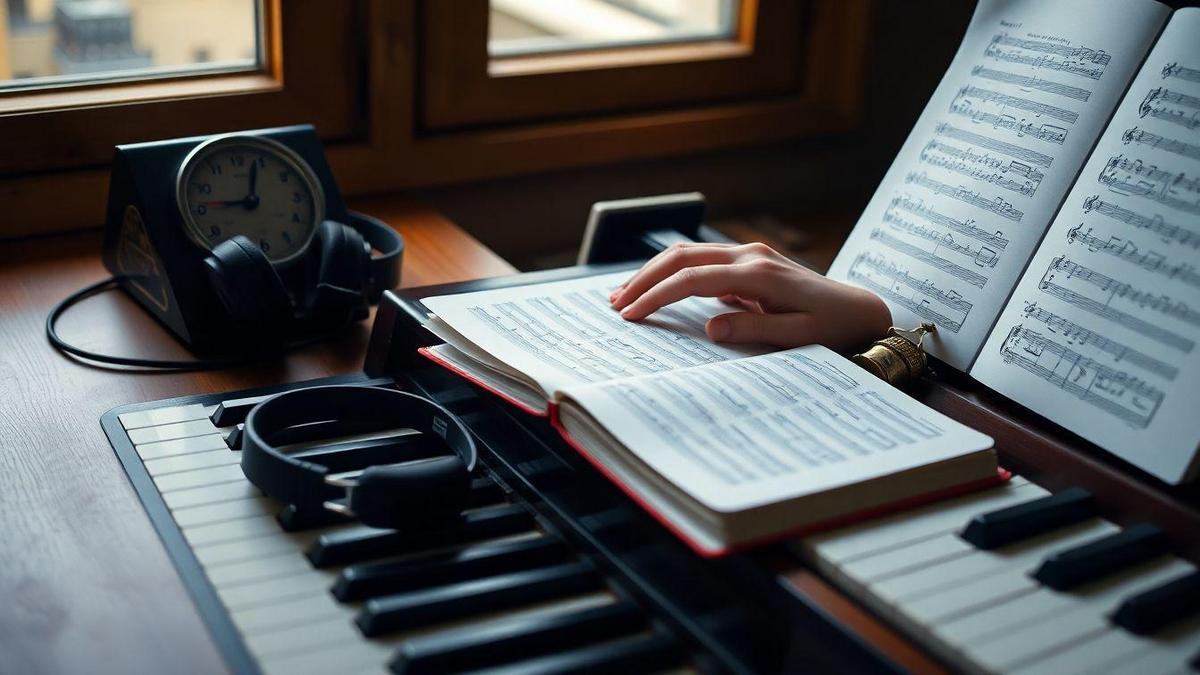
Ear training, timing drills, and sight-reading tips
Start small: sing a note back, tap a beat with a metronome, read one line a day. If theory feels intimidating, a friendly primer on basic music theory and songwriting can make concepts click.
| Drill | What it trains | Time |
|---|---|---|
| Sing a note back | Ear (pitch matching) | 5 min |
| Clap-back rhythms | Timing | 5 min |
| Read one line | Sight reading | 10 min |
These steady steps answer: Talent vs practice: can anyone learn music? — steady practice moves people far.
Slow practice and repetition: speedier learning
Slow practice aligns fingers and ear. Increase speed by 5–10% only after success. Keep sessions under 30 minutes to maintain focus.
My drill list for fast wins (pick two per day):
| Drill | Time | How | Benefit |
|---|---|---|---|
| Sing root–3rd–5th | 5 min | Play root, sing 3rd & 5th | Trains interval hearing |
| Metronome subdivisions | 7 min | Count & clap on & | Sharpens timing |
| Slow scale w/ accents | 8 min | Accent every 3rd note | Improves control |
| Rhythm echo | 5 min | Tap then echo | Builds listening & memory |
| One-line sight read | 10 min | Read new line, keep moving | Boosts fluency |

How I measure progress
I track progress with small, clear milestones and weekly recordings.
Milestones I use:
| Milestone | Test | Goal |
|---|---|---|
| Learn a short song | Play all sections w/o stopping | 3 clean plays |
| Chord changes | Switch two chords for 1 min | No pauses > 1 beat |
| Tempo control | Play with metronome | 10 BPM while steady |
| Rhythm accuracy | Play with backing track | ≤ 2 errors per 16 beats |
| Pitch/tuning | Record & compare | Noticeable fewer off-notes |
Record weekly and compare past clips — the difference is concrete and motivating.
Simple tracking checklist:
- Date
- Piece / Skill
- Tempo / Target
- Pass? (Yes / No)
- Main error (one line)
- Fix to try next session
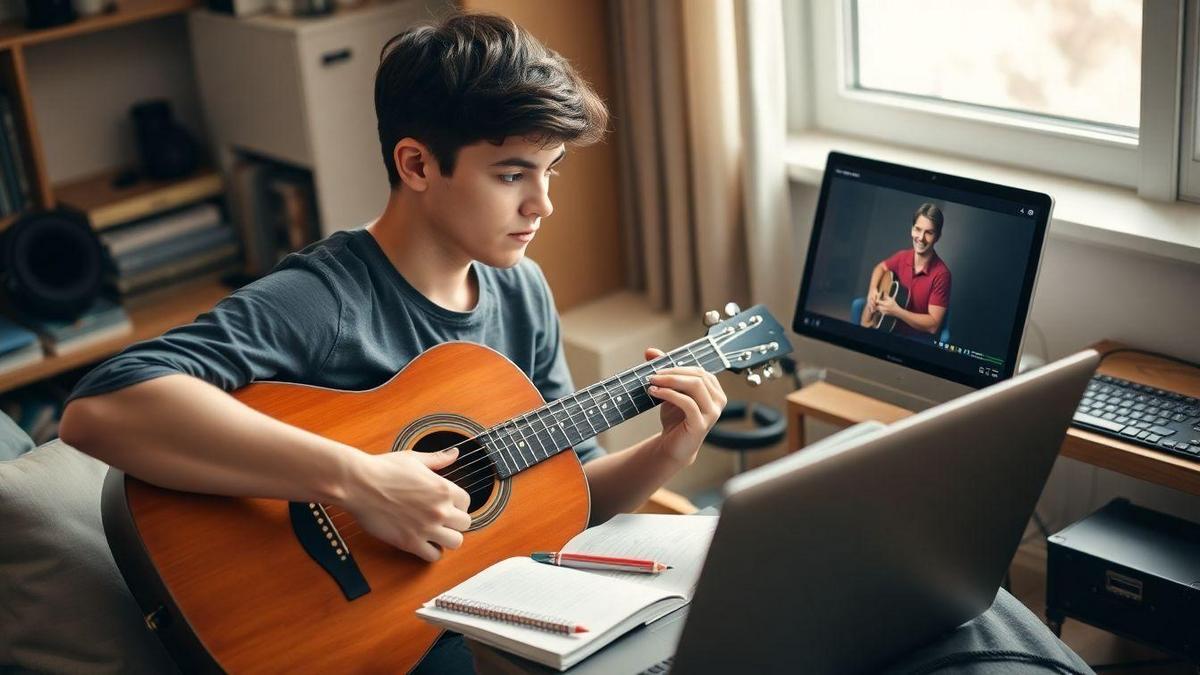
How to pick a teacher or online resource
I asked: Talent vs practice: can anyone learn music? and felt lost at first. A teacher who listens and gives clear goals helped me improve faster. For help finding qualified local or online teachers, consult MTNA.
| Choice | Cost | Speed of progress | Best when |
|---|---|---|---|
| Live teacher | Medium–High | Faster with feedback | You want tailored help |
| Self-teach (apps/video) | Low–Free | Slower without feedback | You have discipline & time |
| Hybrid | Medium | Balanced | You want structure cheap tools |
When to choose a teacher:
- Need structured lessons and plan.
- Need live feedback on posture or tone.
- Stalled after weeks of practice.
When to self-teach:
- Can practice daily without prodding.
- Enjoy exploring at your own pace.
- On a small budget.
Good apps/sites I recommend:
- Yousician — short lessons, feedback (Free Paid)
- TakeLessons — find local/online teachers (Paid)
- JustinGuitar — clear, free guitar lessons (Free/donate)
- SmartMusic — structured practice (School/paid)
- Simply Piano — step-by-step piano (Free Paid)
- Metronome apps — essential for timing (Mostly free)
If you want to reach out for guidance or feedback options, you can contact the site team or learn about the project on the About page.
Questions to ask before signing up:
- What are my short-term goals (3 months)?
- How often can I practice weekly?
- Does the teacher give homework and track progress?
- Is there a trial lesson or refund?
- Does the teacher teach my genre and age level?
- What tech do I need for online lessons?
- How is feedback given between lessons?

How I stay motivated and handle setbacks
I still get discouraged. I keep moving by shrinking tasks and tracking wins. I ask: Talent vs practice: can anyone learn music? — my practical answer: yes, for most people, with focused work.
When I hit problems:
| Problem | What I do | Why it helps |
|---|---|---|
| Hit a wall | Break skill into a tiny part | Makes it doable |
| Lose interest | Play a favorite song for fun | Reminds me why I started |
| Feel tired | Take a short break | Return with more focus |
Ways to keep practice fun and avoid burnout:
- Use a timer for short sessions (10–20 min).
- Alternate tasks: warm-up, technique, song, free play.
- Keep a list of songs you love. Play one for fun each session.
- Practice with a friend or online buddy.
- Use apps/games to make drills feel like challenges.
How to break plateaus:
- Pick a tiny target (e.g., play a tricky bar 3 times).
- Slow the tempo until it’s clean.
- Record weekly 30-second clips to measure change.
- Set weekly (not forever) goals to force focus.
- Vary methods: rhythm, posture, fingering tweaks.
Quick motivation tips:
- Start with five minutes — it often becomes 20.
- Keep a progress board with dates and one-line wins.
- Reward yourself after focused practice.
- Tell someone about a tiny goal (gentle accountability).
- Change environment occasionally.
Conclusion
If you’ve asked Talent vs practice: can anyone learn music? — I’ve stood where you stand. My conclusion: genes can give a head start, but deliberate practice builds the finish line. Think of talent as a tailwind; practice is the steady rowing that gets you across.
My path: short daily sessions, one clear goal, focused drills, regular recording, honest feedback, and tiny wins. Slow, steady work added up; it will for you too. With consistency, focus, and patience, most of us can learn far more than we expect.
For more practical roadmaps and short, usable tips, visit ClickNeutro.
Frequently asked questions
Talent vs practice: can anyone learn music?
Yes — for most people. I’ve seen steady, focused practice produce real gains. Start tiny and build.
Can practice beat natural talent?
Often, yes. Talent can help early, but regular targeted practice usually outpaces raw natural ability over time.
What if I feel untalented?
Start tiny: one song or one scale, five minutes a day. Celebrate small wins and review recordings.
How many times does the keyword appear here?
This article repeatedly addresses the central question Talent vs practice: can anyone learn music? to make the topic clear and searchable.
If you want, I can produce a printable one-page practice checklist or a 4-week starter plan tailored to guitar, piano, or voice.
Site policies: Privacy Policy | Cookies Policy | Terms of Use | Comments Policy
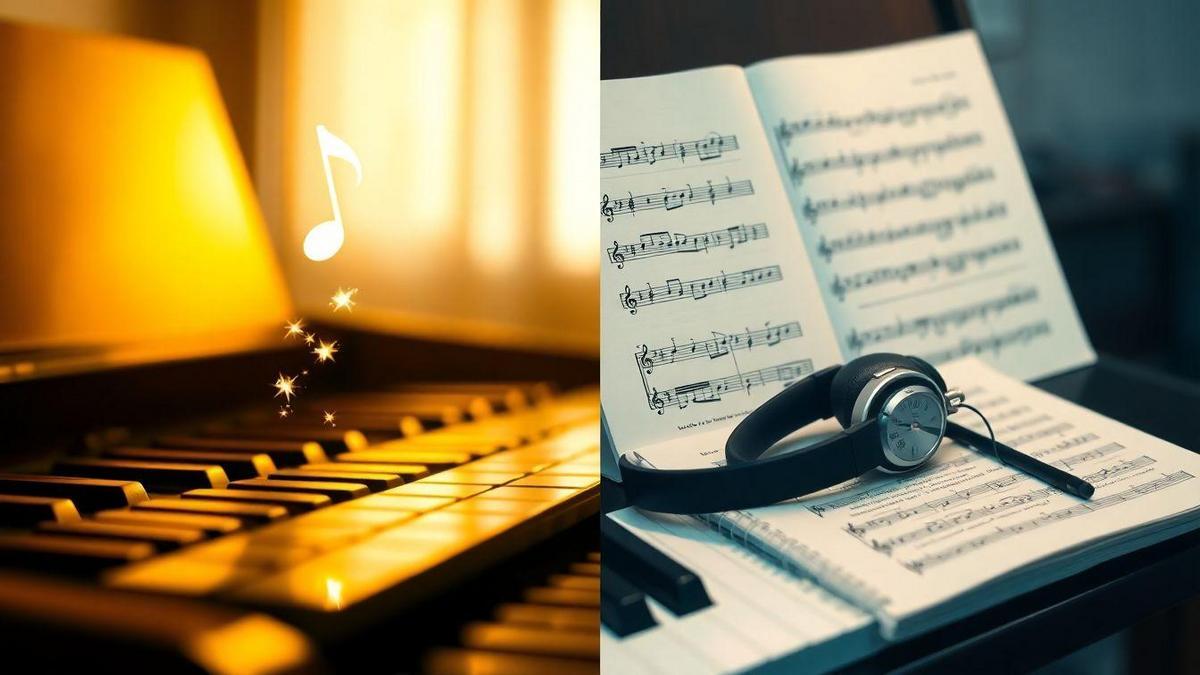
3 comentários em “Talent vs practice can anyone learn music”